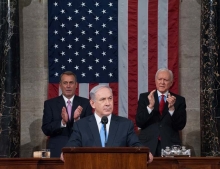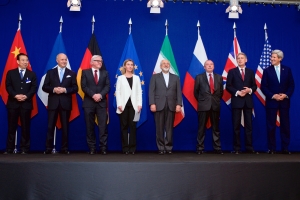
Israel, Public Diplomacy, and the Iran Agreement
Reprinted from the CPD Blog by Philip Seib (Aug 8, 2015)
Since the founding of modern Israel in 1948, no country has been more resolute in its protective friendship than the United States. On occasion, however, the two countries have been at loggerheads, and no dispute has been more fractious than that surrounding the recent international agreement on Iran’s nuclear capacity.
Brokered primarily by the United States, this agreement is seen by Israel as an insufficient deterrent to Iran’s ability to develop nuclear weapons. Israel has directly intervened in America’s highly partisan politics to try to derail the deal by generating public pressure on Congress to vote against what the Obama administration considers a significant diplomatic achievement.
The Israeli presence on this issue is inescapable, albeit sometimes indirect. Pro-Israel organizations, which usually deny any formal connection to the Israeli government, have purchased numerous ads attacking the agreement as a danger not only to Israel, but also to the United States itself. They have mobilized supporters to argue the anti-agreement case to members of congress and opinion leaders.
The American Israel Public Affairs Committee (AIPAC) has been at the forefront of this effort. With more than 100,000 members and 17 regional offices, AIPAC has supporters in every congressional district, and among these are financial contributors to political candidates of both parties. In its ability to quickly galvanize congressional support, AIPAC is recognized as one of the top lobbying groups in the country. AIPAC denies that it operates at the behest of the Israeli government, but the ties are close, even if not formal.
In addition to its American supporters, Israeli diplomatic missions in the United States have delivered a steady stream of messaging such as the “Iran Deal Bulletin,” sent by email several times each week to large lists of recipients. More directly, Israeli Prime Minister Benjamin Netanyahu accepted an invitation from Republican Speaker of the House John Boehner to address a joint session of Congress. This was done without informing the White House, a clear breach of diplomatic protocol that infuriated even some of Israel’s staunch American supporters.
This is public diplomacy at a rare level of intensity. In terms of reaching a big audience, the Israeli campaign has been successful, reflecting sophisticated planning and execution on the part of Israelis and their supporters. But in terms of providing a lesson in how to wield public diplomacy’s tools, before this approach is adopted by other nations as a model for issues related to security, trade, and similar issues, it is worth considering whether such efforts may be perceived as inappropriate meddling and thus prove counterproductive. The message of this campaign, whether stated or implicit, was, “Urge the U.S. Congress to vote against the U.S. president’s diplomacy.” There are plenty of members of Congress who agree with that, some on purely partisan grounds, and others who think that Iran is untrustworthy and that a continuation of economic sanctions might produce a better deal. Beyond that, some are not averse to taking military action to destroy Iran’s nuclear facilities.
All that is part of legitimate debate within the U.S. political system. But does a foreign government have any business jumping into such a debate as wholeheartedly as Israel has?
The Israeli campaign could be seen as classic public diplomacy – a government reaching out directly to a foreign public – or it could be seen as inappropriate interference that could produce an anti-Israel backlash. This is a line public diplomats should be wary about crossing. Even in the world of hardboiled foreign affairs, subtlety and restraint have value. For Israel, the results of its political activity could prove damaging over the longer term. Numerous Western European countries have backed away from Israel due to that country’s policies toward Palestinians, and jeopardizing broad-based American support could mean even greater isolation of Israel.
Of course, it can be argued that by definition public diplomacy involves interfering in another nation’s internal affairs. It is, after all, direct outreach to a foreign population. This is more problematic when the two countries are allies and diplomatic etiquette calls for better behavior. When the stakes are high enough, however, as Israel considers them to be when related to the Iran agreement, the etiquette of public diplomacy might be set aside – the white gloves come off and the switchblades appear. That could have consequences far down the road.
Issue Contents
- Introduction
- A Tale of Two Speeches: American Identity and Diplomacy
- Economic Sanctions as Temper Tantrums
- The U.S.’ Image Among Shia Muslims
- Lessons From the Past: U.S.-Iran Public Diplomacy
- Israel, Public Diplomacy, and the Iran Agreement
- America and Iran: Following Up with Public Diplomacy
- PD News Stories Related to the #IranDeal
Most Read CPD Blogs
-
January 29
-
January 20
-
January 28
-
January 2
-
January 8
Visit CPD's Online Library
Explore CPD's vast online database featuring the latest books, articles, speeches and information on international organizations dedicated to public diplomacy.









Add comment